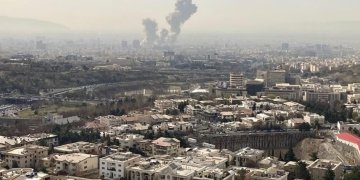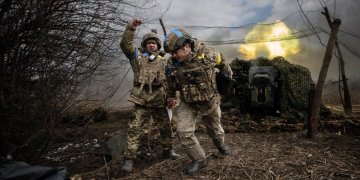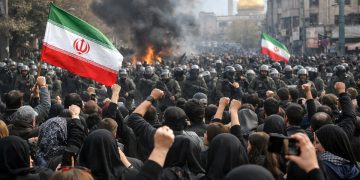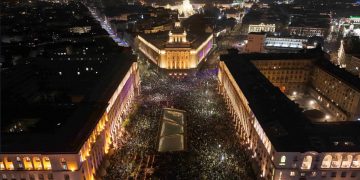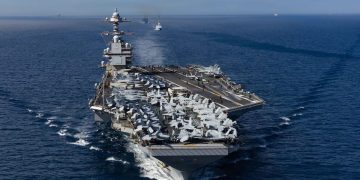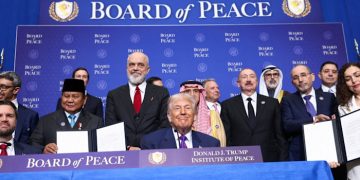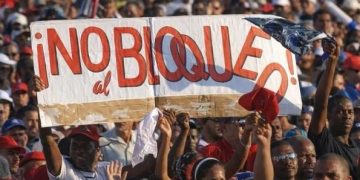Few dispute the crisis of U.S. imperialism. Today it is even accepted that they lost the war in Iraq and they are losing it in Afghanistan. This is very serious for imperialism.
But given that fact, there are many interpretations. From the left there are sectors that support the Italian Antonio Negri, who in his book «Empire» (2000) has theorized about the disappearance of imperialism and the existence of a world government, extraterritorial, in the hands of the G-8, the World Bank, IMF and WTO.
However, the invasions of Iraq and Afghanistan, the disputes with the European Union and Russia in recent years showed U.S. imperialism and the other imperialisms, very specific and active, with governments like the one of George W. Bush and now Obama that play a fundamental role on a global scale.
Others, especially the Castro-Chavist current, are saying that U.S. imperialism is on track to stop being hegemonic and that we are going towards a «multipolar» world (they say this, in addition, embellishing China and Russia as if they were progressive and «anti-imperialist» powers). In this context they explain the civil war in Syria, as if part of this confrontation, where China and Russia, as «progressive», would support the supposedly «anti-imperialist» Assad.
We think they are totally flawed visions of what is happening. Although they do reflect, distortedly, that there is a serious crisis of U.S. imperialism that no longer works with the strength and forcefulness of other decades.
For us, all socio-economic data show that U.S. imperialism remains hegemonic and dominant, although in a very serious political, economic and military crisis without precedents. So we define it as a crisis of domination caused centrally not by the rise of rival powers, but by the mass revolt that shakes the world and the fall of the Stalinist apparatus of the former Soviet Union, by which it lost its main counterrevolutionary partner contributing with their betrayals to sink the rebellions of the people. Now, imperialism launches the counteroffensive on its own account and risk.
It is a crisis that combines three aspects: economic, political and military
We can also define this crisis of domination as a weakening of the hegemony of U.S. imperialism. But the end of U.S. dominance is not on sight, as it happened with British imperialism during and after World War II. There is also no alternative imperialism. China is talked about, but this has no real basis.
Years ago, the bourgeois press and imperialism said that there was a «New World Order» headed by the United States and that was reflected in the «stage of globalization of the economy», of boom of capitalism. Bolstered by the fall of the Berlin Wall and capitalist restoration, they claimed the «historic victory» of capitalism and that we were in a new higher stage of economic development. «The End of History and the Last Man» by Francis Fukuyama became popular.
All of that was falling apart by the reality, since 2007, of the total collapse of the world capitalist economy. With the aggravating circumstance that this crisis took as an epicentre the United States and that was transformed into a global crisis of the capitalist-imperialist system, affecting the major countries of the world and which was deepening in Europe.
We are facing the most serious crisis of U.S. imperialism in its history, since for the first time three crises are combined: economic, political and military. There were other economic cracks (the Wall Street crash of 1987, the Tequila effect of 1994 or the Asian crisis in 1997), but now the global crack combined with military failure in Iraq, which meant the second military defeat since Vietnam, plus the bogging down in Afghanistan. This resulted in a political crisis in the White House, with the George W. Bush administration.
After the fall of the Twin Towers, Bush launched an imperialist counter-offensive invading Afghanistan in 2001 and Iraq in 2003. Thus he intended to display himself to the masses as the global policeman who put an end to «terrorism», who was going to control the Iraqi oil and have a beachhead to stabilize the region, bolstering Israel to defeat the resistance of the Palestinian and other peoples (he failed, for example, in the 2002 coup in Venezuela) and, in turn, he would show a thriving capitalist economy. He ended up failing in all essential points. The proclaimed «New World Order» culminated in a global «disorder» of gargantuan proportions.
All this led to a political crisis in the leadership of U.S. imperialism with the defeat of the Bush project and the entrance of Obama. The United States, birthplace of racism, witnessed an unexpected political event, upon the fact that the people elected Barak Obama, of Afro-descent origin and the Democratic Party as a punishment to the Republican government of George W. Bush, who was blamed for the outbreak of the economic crisis and military defeat in the Middle East.
The Vatican crisis is part of the political crisis of imperialism
The crisis of the Vatican is explained in the context of the unprecedented crisis of imperialism. The Catholic Church could not be exempt from the process of decay of capitalism and increasingly the mobilized and exploited peoples take distance away from the institution.
The Vatican has always been part of the global counter-revolutionary front. Contributing, in unity with the U.S. and European imperialism to try to sustain capitalism and defeat the struggles of the mass movement. In that sense, it was clear the role of the Polish pope John Paul II, who played a major counter- revolutionary role in the capitalist restoration process and actively looked to liquidate revolutions, as for example, with trips to Nicaragua, El Salvador and Argentina for the Malvinas (Falklands) War.
The unprecedented resignation of Pope Ratzinger, something not seen for over 600 years, reflects a severe crisis in the Church and the Vatican. The capitalist crisis and corruption, for example, also affected the Vatican with the Banco Ambrosiano scandal and other cases. Ratzinger has been one of the most reactionary popes and was forced to resign amid a wave of financial scandals and paedophilia.
The appointment of Bergoglio as the new Pope shows that the Church seeks a change of direction, naming for the first time a representative of Latin America and the Jesuit order. Thereby they seek to change the image of the Church as «rich», corrupt and remote from people. They put a character like the Argentinian Bergoglio because he is, just like the rest of the hierarchs of the Church, a conservative reactionary troglodyte, but with a more skilled policy set than the Opus Dei and the Ratzinger wing, who belonged to the old European «apparatus» of the Vatican. Bergoglio possibly may not change much the structures or ultra-reactionary doctrines of the Church, but can give an image of being «closer to the people», of not going in limousine but taking buses or not walking with gold ornaments. But he is a representative of the Argentine Church, one of the most reactionary of South America. He, for example, collaborated with the military dictatorship of Videla, far away from the wings of the Theology of the Liberation or Brazilian «progressionism» who pushed for a Workers Party in the 1980s. This appointment may enhance the image of the Vatican, but not the fundamental crisis of the Catholic Church.
The policy of the carrot and the stick
The political and military failure in Iraq forced Obama to change policy, going to the tactic of «the carrot and the stick» where the core will be the attempt to negotiate conflicts with bourgeois governments and counterrevolutionary leaderships. That is, carrots are priority, but without leaving the stick. Therefore, when faced with the failure of the new imperialist counter-offensive that Obama launched focused on Afghanistan, for its obvious military stalemate, they only had left to negotiate their way out.
The fall of odious dictatorships in several Arab countries are spectacular triumphs of the masses and direct reflection of the crisis of imperialist domination. Especially, they are fruit of the combination of defeat of imperialism in Iraq, the continuity of the Palestinian struggle and the own rise in these countries against the capitalist adjustments. The victories of the Arab revolution deepen the weakening of imperialism in the region, with the fall of the Egyptian dictatorship, which was its main Arab ally to support the Zionist state of Israel against the Palestinian people. The U.S. imperialism was prevented from acting militarily to avoid these triumphs of the masses. In the case of Libya, its intervention had to be indirect through NATO. Neither could the U.S. intervene militarily in Syria. The other consequence of these triumphs is the greater isolation of Israel, the primary imperialist agent in Middle East.
In this context one can understand the conflict with Iran, where it is clear that Obama wants to avoid an armed confrontation or war. So he has urged Israel and the allied countries to have exhausting negotiations. The escalation against Iran is caused by Israel which, in the midst of its internal political and social crisis, is seeking to provoke a war with Iran to unify the Zionist state forcing imperialism to back it up and thus trying to counterbalance the losses that they are suffering. Such is the crisis of imperialism that it even has trouble controlling its main ally in the region and therefore it cannot be ruled out that they go to a military clash if negotiations fail.
Part of this tactical turn, to seek negotiations with the leaderships, are the peace talks between the government of Turkey and the leaderships of Kurdish movement PKK or the new negotiations between the government of Colombia with the FARC leadership.
The most important conclusion we can draw from this stage is that the crisis of imperialist domination results in the sharpening of the class struggle in the major capitalist metropolis, the opening of pre- or directly revolutionary situations and that the working class plays a fundamental role in the defence of the rights of hundreds of millions of inhabitants of those powerful capitalist nations.
Similarly, given the exacerbation of the rebellions of the peoples against the imperialism attempt to unload upon them the burden of the economic crisis, we can expect uprisings in large areas of the planet as today happens in the Arab world.
That is to say, we are at the beginning of a new process in which begin to overlap in time the struggles of the workers and peoples of the metropolis (such as Europe) with uprisings in several dependent countries, as in the case of North Africa.








